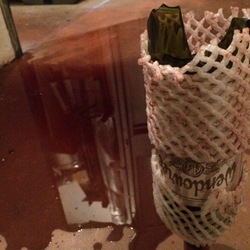Eponymous
Jean Foillard
"Cuvée Corcelette" Morgon Gamay 2021
Foillard’s “Cuvée Corcelette” comes from the eponymous climate in Morgan where Jean’s holdings include vines over 80 years of age. This is a stunning wine that is so Foillard in style: fresh and deep.
Popped and poured; enjoyed over two days. Consistent over both days but seemed to round out a little more on Day 2. The wine pours a deep, hazy ruby with a near opaque core and an almost fuchsia rim; medium viscosity with light staining of the tears and some signs of sediment. On the nose, the wine is developing with sensational notes of macerated raspberries, red flowers, carrot juice, celery root, chanterelles, granitic earth and minerals. On the palate, the wine is dry with medium tannin and medium+ acid. Confirming the notes from the nose. The finish is medium+ and so easy to love. Super balanced. Drink now and over the next 10+ years. — 2 years ago
Bedrock Wine Co.
Cuvée Karatas Sémillon - Sauvignon Blanc Blend 2022
The ‘22 Karatas from Bedrock is a Bordeaux blend of Semillon and Sauvignon Blanc from their eponymous vineyard. Pale gold with a nose full of honeysuckle and orchard fruit. That’s backed by mouth-filling melon and pear with a noticeable backbone. Excellent. — 2 years ago
Bodegas Cota 45
Ube de Ubérrima Carrascal Palomino Fino 2019
Blend of different types of Palomino (Palomino Fino, Palomino Jerez and Palomino Pelusón) from a single vineyard within the Pago de Carrascal, in Sanlúcar (not to be confused with the eponymous Carrascal in Jerez, further inland). Located to the south of Miraflores, this is one of the most Atlantic influenced Pagos in Sanlucar, and also one of the first to be replanted after phylloxera – with vines over 100+ years old. Elegant, mineral, saline — 2 years ago
Aldo e Riccardo Seghesio
La Villa Barolo Nebbiolo 2015
Served to me double-blind at Tasting Group. The wine appears a deep garnet color with a transparent core; medium+ viscosity with no staining of the tears and no signs of sediment. On the nose, the wine is developing with ripe bramble fruits: a mix of blackberries and raspberries with Morello cherry, roses, tar, talcum powder, dried herbs, and gravelly soil. On the palate, the wine is dry with high tannin and medium+ acid. Confirming the notes from the nose. The finish is long and delicious. Alcohol is medium+. Initial conclusions: this could be Nebbiolo, Sangiovese, Pinot Noir or Grenache from Italy or France. Because of the high tannin and talcum powder/tar/roses combo (and the utter lack of staining), my final conclusion is: Nebbiolo; from Italy; from Piemonte; Barolo…from Monforte d’Alba. I chose 2016 because it shows good great balance of structure and fruit. Ooooof…that was too close.
“La Villa” is Fratelli Seghesio’s most precious wine and until now, I can only ever recall drinking their Barolo “classico” and Barbera d’Alba and only on a few occasions. Believe it or not, “La Villa” is the oldest, single MGA bottling from any producer in Castelletto. The name “La Villa” is an old name for an area within Castelletto when it was once a commune all to itself. The distinguishing feature of “La Villa” is the eponymous ridge that runs perpendicular with Collaretto and Vigna Rionda to the east, across the stream of Talloria di Castiglione. The vines facing south are dedicated to their Nebbiolo while the vines facing north are predominately Barbera and Dolcetto. A very tasty Barolo. Drink now through 2035. — a year ago
Eponymous
Spring Mountain District Cabernet Sauvignon
Oaky plum, sour cherry, forest floor, subtle sweet reminiscent of jasmine — 2 years ago
Montevertine
Il Sodaccio Di Monte Vertine Toscano Sangioveto Canaiolo 1997
This used to be Montevertine’s “second” wine (after Pergole Torte, obviously) but the vineyard was torn out and replanted in 1998. After that, their eponymous bottling was elevated to take its place while “Pian del Ciampolo” eventually became the “third” wine. Truthfully, they are all three different expressions of Radda so don't take my numerical rankings as a hierarchy of quality (though one could certainly make arguments in terms of importance). I digress, “Il Sodaccio” is producing fruit once again however, the singular expression is now history. This bottle represents “Il Sodaccio’s” swan song.
From magnum. Opened about four hours prior to service. The 1997 “Il Sodaccio” pours a garnet color moving to a slightly orange rim. Medium viscosity with light staining of the tears. On the nose, the wine is vinous but surprisingly spry given it’s a quarter century old. The fruit is more or less a mix of ripe and dried cherries, red plums, curaçao, cacao, porcini, dusty earth and some warm spices. On the palate, the wine is dry with medium tannins that have well integrated but still there. Acid is medium as well. Confirming the notes from the nose. The fruit is round while the finish is long and a touch savory. A lovely expression of Montevertine that extolls the virtues of the 1997 vintage with its abundant fruit and soft, friendly character. I mentioned to our guests that this bottle gave me the feeling of a warm hug from an old friend. Drinking well now and while I don’t expect further positive development, this magnum certainly has the legs for another 10 years. — 2 years ago
Luigi Baudana (G.D. Vajra)
Baudana Barolo Nebbiolo 2020
Popped and poured; enjoyed over the course of three days and consistent throughout. The 2020 “Baudana” from the eponymous MGA pours a gorgeous, luminous garnet color with a transparent core; medium+ viscosity with no staining of the tears. On the nose, the wine is developing with fabulous notes of fresh red roses, Morello cherry, dried herbs, Eastern spices, and dried earth. On the palate, the wine is dry with medium+ tannin and medium+ acid. Confirming the notes from the nose. The finish is long and super elegant. My, my how I love the 2020 vintage in Barolo. They are so easy to enjoy in their youth ever so elegant. Drink now through 2040. — a year ago
Azienda Agricola Fontodi
Flaccianello della Pieve Colli Toscana Centrale Sangiovese 2011
This is my 3000th tasting note on Delectable so I suppose I should celebrate by opening something fun. Flaccianello? Ovviamente!
While it’s labeled an IGT and colloquially considered a Super Tuscan, Flaccianello delle Pieve could legally be labeled as a Chianti Classico Riserva. However, Giovanni Manetti of Azienda Agricola Fontodi opts not to do so (despite the fact that he’s the current Chairman of the Conzorsio). The name, “Flaccianello delle Pieve” comes from the eponymous single-vineyard; the original source of grapes. However, around the turn of the millennium, Flaccianello became a blend of Fontodi’s best fruit throughout the estate. Over all the years, despite the changes in fruit source and aging regimen, Flaccianello remains 100% Sangiovese and 100% Panzano in Chianti.
Popped and poured; enjoyed over the course of a couple of hours. The 2011 pours a deep, translucent garnet with a near opaque core; medium+ viscosity with moderate staining of the tears and some signs of sediment. On the nose, the wine is vinous with notes of ripe and dried Morello cherry, raspberries, red flowers, leather, mushrooms, cigar box, menthol, organic earth and wonderful fine baking spices. On the palate, the wine is dry with medium+ tannin and medium+ acidity. Confirming the notes from the nose. The finish is long, delicious and warming as the alcohol is pretty elevated. But whoa…what a beauty.
Okay, yeah…this is a modern take on Chianti Classico but my goodness, this is undeniably delicious and unabashedly Italian. Back in 2011, Flaccianello was aged in a combination of barriques from Troncais and Allier, all 100% new; an era that was arguably the most modern for this wine. Over the last 10 or so years however, there has been a shift towards less time in new barrique and large casks have now been introduced for the last six months of cellar aging. While I look forward to trying some of these more contemporary examples, I am very impressed with this 2011 and expect it will continue to show well through 2035. — 2 years ago






Will Stanley
I’ve been excited to revisit Duncan Savage’s eponymous red from the 2018 vintage, which I last tried around four years ago having just shaken off a bout of Covid, senses struggling. Even then, it was clear how promising this wine was, and now, with a little more bottle age, it’s absolutely singing. It’s a pure, bright fruited 100% Syrah which has a tremendous savoury character, with a telltale bolt of iron on the nose. On the palate it has enormous structure, with sappy blood orange fruit and white pepper, and wonderful minerality. This is such an utterly drinkable wine, with more than enough in the tank for another decade or two. Wonderful stuff. — 8 months ago